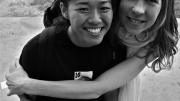“Making a documentary is really similar to playing on a basketball court,” says Melissa Johnson ’00 ('01). She would know. The former Harvard basketball captain and star recently wrote, produced, and directed her first feature-length documentary, No Look Pass, about, naturally, a Harvard basketball player.
Her subject, Emily Tay ’08, fits a unique set of labels: basketball star, Burmese American, gay. But Johnson says No Look Pass isn’t fundamentally an Asian-American film, a gay film, or even a sports film—it’s a coming-of-age film about Tay’s struggles to pursue her own dreams, often in defiance of her parents, who also appear in the film. It follows Tay from Harvard to Germany, where she plays pro basketball and begins dating an American servicewoman, despite Don’t Ask Don’t Tell. No Look Pass came out at Outfest, a LGBT film festival, last July, but Tay has yet to come out to her mother, who still wants her daughter to marry someone chosen by her parents, according to tradition.
Tay flat out refused when Johnson first tried to interview her, for Act As If, a short film about longtime Harvard women’s basketball coach Kathy Delaney-Smith. When Tay relented, out poured the personal story that became No Look Pass. At the end of that initial interview, says Johnson, “The cameraman was crying, Emily was crying, I was crying. I walked out that night and knew it was meant to be.” That was in 2007.
With Tay on board—“I’m pretty shy, so I was super nervous at first,” she says; “I think the filming helped me come out of my shell”—Johnson began. The film took three years; Johnson financed it by working full-time as a Web and video producer for MTV and then the BBC, before going freelance for more flexibility. There were multiple trips to Harvard, Los Angeles (where Tay’s family lives), and Germany. “How many times did I sleep on a random mattress or on Emily’s floor?” says Johnson with a laugh. “Oh, the glamorous life of a filmmaker.”
Not that she ever had any illusions of glamour. In college, she did all the internships she could to gain filmmaking experience. She caught the documentary bug after watching Hoop Dreams, about two black high-school students. At Harvard, she jokingly threatened Delaney-Smith with making a documentary about her. She first met the coach when she was being recruited out of high school. Initially, Johnson chose the University of North Carolina, but after watching Delaney-Smith coach Harvard to an upset over Stanford in the 1998 NCAA tournament, she headed for Harvard.
As fate would have it, she played only one complete season as center before blowing out her knee senior year. Moving to the sidelines was difficult, but she credits that experience with helping her see the court from a different perspective, making her both a better coach (for two years after graduation) and a better observer during filmmaking. When she says filmmaking and basketball are very similar, she’s expressing what she loves about both: neither is easy, physically or emotionally. “You have a small group of people engaged in a really intense enterprise that perhaps the rest of the world doesn’t care about,” she says. “You have this strong sense of camaraderie and mission.”
But it’s not true the rest of the world doesn’t care. No Look Pass has been accepted at the International Documentary Film Festival Amsterdam, the premiere festival for documentaries. Johnson has come a long way since hauling gear for other people’s documentaries, but the lessons of discipline and hard work from the basketball court haven’t left.








